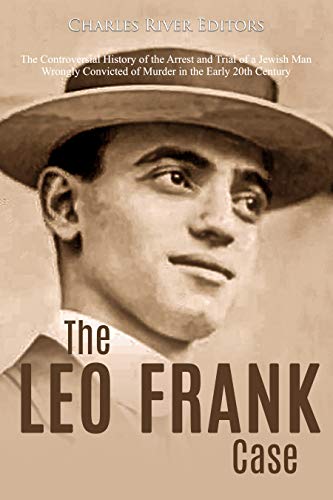The Leo Frank Case: The Controversial History of the Arrest and Trial of a Jewish Man Wrongly Convicted of Murder in the Early 20th Century
*Includes pictures*Includes excerpts of contemporary accounts*Includes a bibliography for further reading*Includes a table of contents “The pathological conditions in the city menaced the home, the state, the schools, the churches, and, in the words of a contemporary Southern sociologist, the ‘wholesome industrial life.’ The institutions of the city were obviously unfit to handle urban problems.
*Includes pictures
*Includes excerpts of contemporary accounts
*Includes a bibliography for further reading
*Includes a table of contents
“The pathological conditions in the city menaced the home, the state, the schools, the churches, and, in the words of a contemporary Southern sociologist, the ‘wholesome industrial life.’ The institutions of the city were obviously unfit to handle urban problems. Against this background, the murder of a young girl in 1913 triggered a violent reaction of mass aggression, hysteria, and prejudice.” – Leonard Dinnerstein, historian
The Jim Crow South has been notorious for miscarriages of justice for decades, and cases like the Scottsboro Boys continue to be commemorated for the manner in which institutionalized racism ensured the wrongful convictions of minorities. The attention given to these cases raised nearly every potential issue implicating criminal procedure among the states. While the Bill of Rights had ensured a number of rights for criminal defendants, the states had previously been allowed to interpret those rights, leading to instances where defendants weren’t provided adequate legal representation. For example, the case of the Scottsboro Boys compelled the U.S. Supreme Court to order new trials in Powell v. Arizona (1932), which went a long way to determining and codifying some of the rights of criminal defendants in state courts.
However, blacks weren’t the only ones discriminated against in the South, as the Leo Frank case made clear in the 1910s. While 20th century anti-Semitism has been (and often continues to be) viewed mainly as a problem in European countries like France and Germany, anti-Semitic hysteria led to one of the most shocking episodes of mob justice in early 20th century America.
In 1913, Mary Phagan, a young Georgia factory girl and the daughter of tenant farmers, was raped and killed, and suspicion fell upon Leo Frank, the Jewish-American factory manager, who was subsequently arrested, tried, and convicted of her murder based on the thinnest of circumstantial evidence. The entire case against Frank rested on the testimony of the factory janitor, Jim Conley, despite the fact Conley had been arrested almost immediately after Frank when he was spotted washing what appeared to be blood off his clothes. Subsequent investigations determined that Conley had written notes found by Phagan’s body, and Conley’s testimony explained this extremely incriminating evidence away by claiming Frank had dictated the notes to him to write down before they moved the body to the location it was discovered. Modern historians now believe Conley committed the murder himself, but based on his testimony, Conley only received a sentence of one year for being an accomplice after the fact.
The conviction was controversial enough in its day that Georgia Governor John M. Slaton commuted Frank’s death sentence, which stirred up such a frenzy that a mob driven by their prejudices took what they saw as justice into their own hands. The result was a stark reminder of the roles that race, class, and religion played in the South during the beginning of the 20th century.
The Leo Frank Case: The Controversial History of the Arrest and Trial of a Jewish Man Wrongly Convicted of Murder in the Early 20th Century examines the events that led up to the trial, how it was conducted, and the horrible aftermath. Along with pictures depicting important people, places, and events, you will learn about Leo Frank like never before.
Bestsellers 2021
Auto Amazon Links: No products found.







Comments
Comments are disabled for this post.